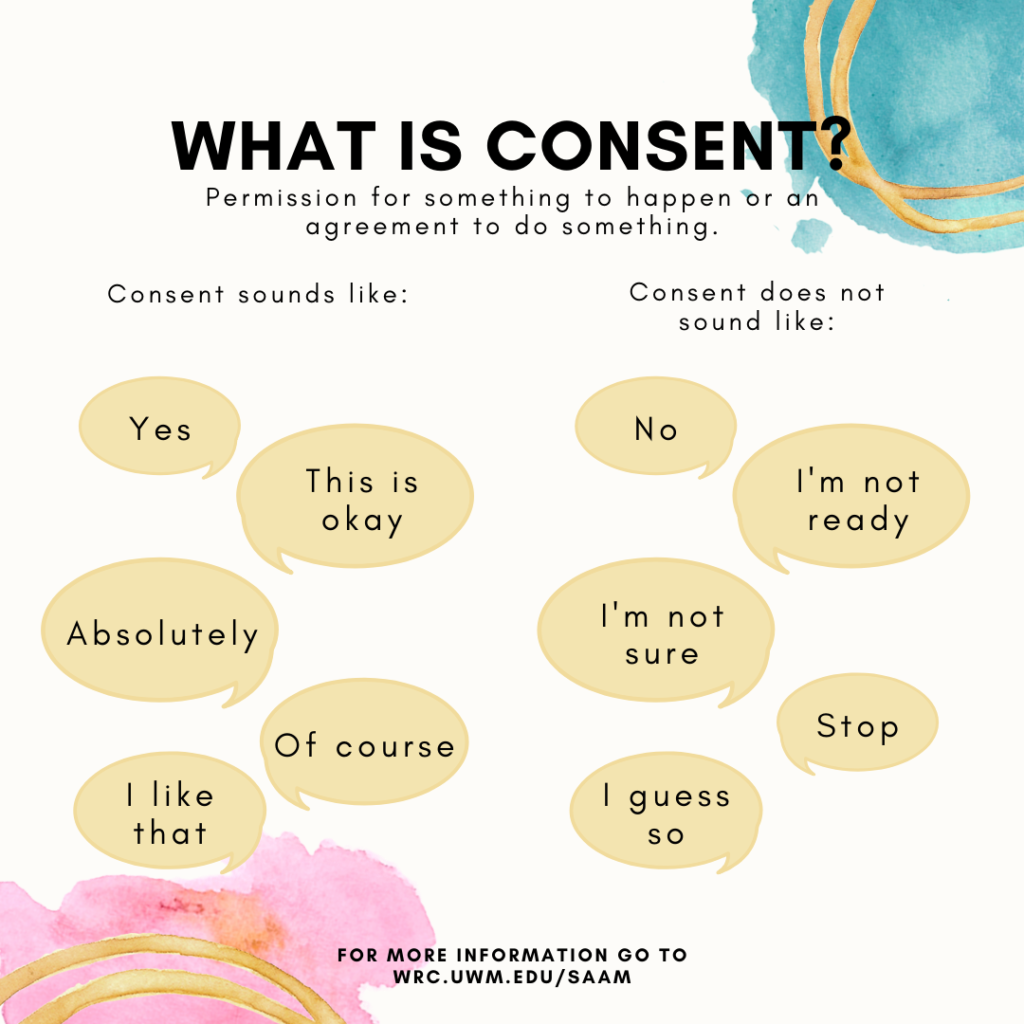April is Sexual Assault Awareness Month
April is Sexual Assault Awareness Month, with prevention and awareness events across campus hosted by the Sexual Assault Awareness Month Committee. The complete calendar of events can be found here.
The activities culminate on Denim Day with the Survivor Support and Wellness fair in the Union Concourse from 12-2 pm and denim displays across campus.
Every year on Denim Day, the last Wednesday in April, people wear denim to call for an end to victim-blaming myths and to show support to victims and survivors of sexual violence. Denim Day has its origins in a 1999 Italian Supreme Court decision that overturned a rape conviction because the victim wore “tight jeans”. To learn more about the history and movement of Denim Day, visit denimday.org.
To help offices across campus recognize Denim Day, the Women’s Resource Center is offering denim display kits to all offices. To learn what is in this kit and request one for your office, please fill out this form.
We encourage everyone to participate in the events highlighted in this year’s SAAM calendar and to stay connected with each of our campus partners on social media! Please join the Sexual Assault Awareness Month Planning Committee by wearing your favorite piece(s) of denim to support survivors within our UWM community on Wednesday, April 24, 2024.
Thank you to our SAAM planning committee members including the Student Health and Wellness Center, Victim Advocacy, Student Involvement, American Indian Student Center and Electa Quinney Institute, The Military and Veterans Resource Center (MAVRC), Roberto Hernandez Center, Student Parent Success Program, and the LGBTQ+ Resource Center.
Sexual Assault Awareness Month Events 2024
Monday, April 1– Stone Decorating, WRC (EG37), 1:00-3:00 pm
Tuesday, April 2- Trauma Informed Yoga with Moving Galaxy | Ballroom, 6:00-7:00 pm
Wednesday, April 3 – Bystander Intervention Training, NWQ 1871, 5:30-7:00 pm
Thursday, April 4- AKA Self Defense, Klotsche Center Room 110, 1:00-3:00 pm
Thursday, April 4 – How to be Your Child’s Sex Educator Workshop, Children’s Learning Center, 5:30-7:30 pm
Friday, April 5 – Swipe Safely, NWQ 1871, 10:30-11:30 am
Wednesday, April 10 – Healthier Relationships-A Boundaries Workshop, WRC Union EG37, 2:00-3:00 pm
Monday, April 15 – Enthusiastic Consent Workshop, WRC Union EG37, 11:00-12:00 pm
Monday, April 15 – Denim Decorating Party, WRC Union EG37, 12:00-2:00 pm
Tuesday, April 16– Feminist Fiber Arts: Denim Day Embroidery, WRC EG37, 2:00-3:00 pm
Tuesday, April 16 – Reproductive Justice Workshop, WRC Union EG37, Session 1 @ 1:30, Session 2 @ 3:30
Friday, April 19 – Snack and Chat on Relationships, NWQ-D, 1:00-2:00 pm
Monday, April 22 – Denim Decorating Party, WRC Union EG37, 12:00-2:00 pm
Tuesday, April 23 – Sex Chats, LGBTQ+ Resource Center EG35, 5:00-7 :00 pm
Wednesday, April 24- Denim Day,
- Survivor Support and Wellness Fair, Union Concourse12:00-2:00 pm
- Sound Bath, Fireside Lounge, 3:00-3:45 pm
- Survivor Voices, Fireside Lounge, 5:00-7:00 pm

View the Events Calendar for more information on all SAAM events.
UWM Campus Resources for those facing violence
- Confidential Victim Advocate:
UWM’s Confidential Survivor Support and Victim Advocacy services continue to be available remotely to students who have experienced sexual, domestic, or relationship violence. UWM’s confidential victim advocate helps survivors understand and navigate their options and can provide emotional support, as well as legal, academic, and medical advocacy. The advocate can assist in locating and connecting students to online resources as well as resources in their community.For services or questions, please contact the advocate confidentially by phone at 414-229-4582 or send an email to victimadvocacy@uwm.edu. - Title IX Information – Get Help and Learn Your Options
- Dean of Students – Make a Report
Off-Campus and Community Resources
Statistics related to sexual assault
- As of 1998, about 1 out of 6 women and 1 out of 33 men in the United States have report having experienced completed or attempted rape at some point in their lives*.
- About half (51.1%) of female victims of rape reported being raped by an intimate partner and 40.8% by an acquaintance. Over half (52.4%) of male victims report being raped by an acquaintance and 15.1% by a stranger†.
- As of 2015, 47% of transgender people reported having experienced sexual assault: 51% of transgender men, 37% of transgender women, and 55% of nonbinary people§.
- 44% of lesbians and 61% of bisexual women experience rape, physical violence, or stalking by an intimate partner, compared to 35% of straight women‡.
- 26% of gay men and 37% of bisexual men experience rape, physical violence, or stalking by an intimate partner, compared to 29% of straight men‡.
Sources: *https://www.rainn.org/statistics/victims-sexual-violence, †https://www.nsvrc.org/statistics, ‡https://www.hrc.org/resources/sexual-assault-and-the-lgbt-community, §https://www.ustranssurvey.org/reports
What is consent?

- Freely given – decision is made by all participants without pressure, force, manipulation, or while drunk or high
- Reversible – anyone can change their mind about what they want to do at any time, even if you’ve done it before or are in the middle of sex
- Informed – be honest. for example, if someone says they’ll use a condom and then they don’t, that’s not consent
- Enthusiastic – if someone isn’t excited, or really into it, that’s not consent
- Specific – saying yes to one thing (like going to the bedroom to make out) doesn’t mean they’ve said yes to others (like oral sex)
Information from Planned Parenthood
Consent 101:
- People can change their minds
- Body language is always important – if someone looks uncomfortable, they probably are
- Don’t manipulate or pressure your partner into having sex/participating in sexual activities
- No means no
- Communicate
Consent from an asexual perspective: